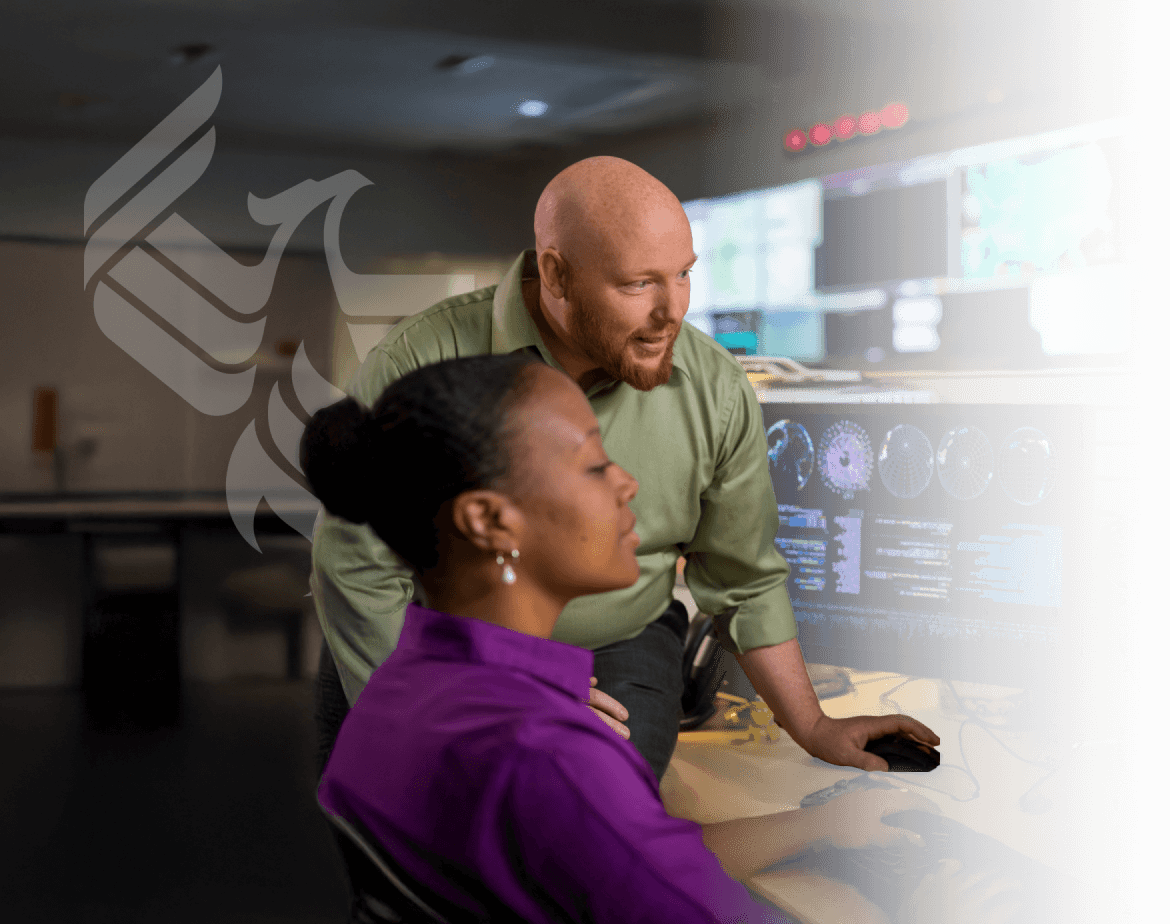Articles > Information Technology > Tech credentials to help you upskill and stay relevant
Tech credentials to help you upskill and stay relevant

Written by Michael Feder

Reviewed by Kathryn Uhles, MIS, MSP, Dean, College of Business and IT

As a field, information technology is constantly changing. Breakthroughs and inventions can be landscape-changing, and they happen every day. So it’s doubly important to keep skills sharp throughout a tech career. Take a look at some of the major topics surrounding technology certificates and certifications, and why they are important.
Why are tech credentials important?
Preparing for roles in the technology field generally requires more than on-the-job experience. An educational background, supplemented by certificates and certifications in specific, in-demand subjects, can help make a resumé more well-rounded. Some roles, in fact, require employees to consistently upskill and pursue certificates or certifications proving their abilities. In addition, remaining relevant during a career may require additional credentials over time. It’s important to be a lifelong learner.
While automation and advanced robotics may make certain business processes more efficient, new technologies call for specialists who understand them. Without investment on the people side of the equation, new tech may not produce the intended results.
How to get tech certificates and certifications
Although thousands of technology credentials are out there, they have many aspects in common. Requirements generally include:
- Taking a prep course
- Sitting for an exam
- Paying a fee for the prep course/exam
- Completing the course online
Certificates and certifications vary in difficulty and experience requirements. Many are accessible to anyone, regardless of their work experience. For more advanced credentials, however, time spent working professionally is a prerequisite.
22 tech certificates and certifications to have on your radar
Let’s check out some of the credentials on offer from major tech companies and credentialing organizations. This is not an exhaustive list, but it serves to provide insight into some of the opportunities out there. Do research depending on the particular interests and career path.
This course is designed for beginners in the IT field, even for those with no educational background or degree.
Topics:
- Customer support
- Hardware assembly
- Networking
- Operating systems
This program includes an “applied learning project,” mimicking real-world IT problems to better prepare students with skills they’ll need in the workforce.
This certificate also centers on beginner-level IT skills, with a focus on coding and task automation. Automating tasks can help make business tasks and data management more efficient, making it an important IT skill.
Topics:
- Python scriptwriting for automation
- IT resource management at scale
- Virtual and physical machine management
- Leveraging Git and GitHub
According to the program page, this program does not require experience. It does, however, build on IT fundamentals that are taught in the IT Support Professional course.
Nearly everything done on the internet produces data, which data analytics professionals can leverage to inform business decisions. This course focuses on how data is collected, organized, analyzed and visualized for day-to-day operations.
Topics:
- Data organization, including spreadsheets, SQL and R programming
- Data analysis tools and visualization
- Data presentation and findings
- Ethics of data
Google also offers two industry specializations: finance and public sector. These were developed in conjunction with the University of Illinois and the University of Michigan, respectively.
UX, or user experience, design focuses on how end users interact with an application, program or service. It’s a subtle art that combines an understanding of technology and psychology.
Topics:
- Wireframe creation
- UX design
- Learning and implementing the design process
- UX research and basic concepts
By the end of this course, students will have created a portfolio, including a mobile application and website. This can be helpful material when students go on to the next steps in their careers.
EC-Council (International Council of Electronic Commerce Consultants)
Organizations employ ethical hackers to find threats and vulnerabilities in their cybersecurity infrastructure. This certification tests the essential background required for work in this field, and it does require some background knowledge in IT. EC-Council recommends two years of IT experience.
Topics:
- Identifying attack techniques
- Hacking tools and techniques
- Cybersecurity methodology, including foot printing and reconnaissance
This certification prepares IT specialists to protect businesses from cybersecurity threats and anticipate threats. It’s suited for individuals with experience in IT looking to make a transition into cybersecurity.
Topics:
- Security across multiple operating systems and devices
- Risk management and anticipation
- Threat assessment
- Cybersecurity monitoring and analysis
Microsoft
This certification covers the fundamentals of implementing and using Microsoft 365. It measures understanding of SaaS solutions and basic cloud services.
Topics:
- Basic ideas in cloud computing
- Microsoft 365 services
- Basic security and compliance
- Pricing and support
Microsoft Azure is the company’s cloud computing platform, and this certification can prove an employee's know-how on this popular platform, including understanding the different cloud computing models, security protocols, and basic networking and storage concepts.
Topics:
- Architecture of Azure services
- Management and governance of Azure services
- Basic cloud computing fundamentals
This certification focuses on cybersecurity. Students demonstrate a fundamental understanding of cyberthreats and how Microsoft services can be used to defend against them.
Topics:
- Security, compliance and identity
- Azure compliance
- Azure Active Directory
CompTIA
The CompTIA Security+ certification focuses on security fundamentals to help keep business networks safe. It emphasizes practical skills and problem-solving to better prepare students for real-life challenges.
Topics:
- Assessing security status of a network
- Monitoring for cyberthreats
- Acting in the event of cyberattack
This beginner certification delves into what it takes to establish and maintain a network for a business. It includes many of the fundamentals of networking, security and troubleshooting that are important in IT support roles.
Topics:
- Implementing a network
- Network operations and security
- Network and cloud architecture fundamentals
This certification covers the major aspects of IT support, making it a good choice for someone looking for a thorough and broad background for work in this field. According to CompTIA, this certification emphasizes “performance testing to prove pros can think on their feet to perform critical IT support tasks.”
Topics:
- Understanding and implementing SaaS applications
- Diagnosing and repairing common IT problems
- Implementing operating systems
- Cloud virtualization and security
Cisco
CCT represents the entry-level certifications on offer from Cisco. Completion of these certifications requires a functional understanding of Cisco systems, including repair, restoration and replacement.
The three courses under this CCT certification are:
CCT Collaboration
This CCT certification track tests the technical ins and outs of on-site support of Cisco systems.
Topics:
- Cisco operating environments and endpoints
- Identifying and understanding Cisco software and hardware
- Leveraging Command-Line Interface (CLI) for Cisco product service
CCT Data Center
This certification focuses on Cisco systems that deal with data management and security.
Topics:
- Networking fundamentals
- Data center hardware and software
- Field servicing and equipment replacement
- Troubleshooting common problems
CCT Routing and Switching
This certification focuses on Cisco routers, switches and operating environments.
Topics:
- Identifying Cisco router hardware
- Leveraging Command-Line Interface (CLI) for Cisco product service
- Configuring remote servers
- Recognizing connection endpoints
Amazon
This certification focuses on the fundamentals of cloud computing on the AWS platform. It requires no experience and can serve as a jumping-off point for later certifications.
Topics:
- Basic IT services and the AWS Cloud
- Basic security concepts
- Billing and pricing models
An advanced certification, the AWS Certified Solutions Architect – Professional designation indicates practical knowledge of AWS systems. It’s designed for those with at least two or more years of experience specifically operating with AWS products.
Topics:
- Designing and deploying AWS applications
- Advanced AWS functionality, such as CLI and API
- Evaluating and creating AWS architectures for business applications
AWS offers specialized certifications in a number of topics, including data analytics, machine learning and more. These certifications demonstrate specific skills that solve specific problems in the world of cloud computing.
With the AWS Certified Security – Specialty credential, specialists can evaluate and implement important cybersecurity solutions to protect businesses from cyber threats.
Topics:
- Securing AWS workloads
- Classifying data and relevant AWS protection protocol
- Designing security measures at scale
SAS Global
SAS offers academic discounts for students and educators looking to save on their exam costs.
This certification focuses on data integration skills, particularly in SAS software and services.
Topics:
- SAS Business Analytics architecture
- Metadata creation and management
- Job deployment
- Working with transformations
Machine learning and AI open up a variety of opportunities when it comes to drawing novel insights from data. This certification requires passage of three exams focusing on machine learning, forecasting and natural language processing.
Topics:
- Machine learning
- Computer vision
- Data optimization
This certification proves specialists’ aptitude managing the servers, data repositories and operating systems that make up the SAS platform.
Topics:
- Server status monitoring
- Security configuration for SAS servers
- Data source connectivity
- Metadata management
The University of Phoenix connection to tech certifications
Individuals who complete tech credentials described in this article may choose to go on to pursue a bachelor’s or master’s degree to take their expertise to the next level. At University of Phoenix (UOPX), these individuals can earn credits toward their degree by leveraging what they’ve learned in a certificate or certification program.
Through the UOPX Prior Learning Assessment (PLA), students can demonstrate skills they’ve learned prior to taking on a UOPX degree program. This can save them time and money when pursuing their degree, and help them take the most advantage of their education.
In addition, UOPX students enjoy several discounts and offers that make earning tech certificates and certifications more accessible. These include exam discounts and content aligned with the credentials, including those from AWS, EC-Council and CompTIA. Learn more about tech-aligned learning from University of Phoenix!

ABOUT THE AUTHOR
A graduate of Johns Hopkins University and its Writing Seminars program and winner of the Stephen A. Dixon Literary Prize, Michael Feder brings an eye for detail and a passion for research to every article he writes. His academic and professional background includes experience in marketing, content development, script writing and SEO. Today, he works as a multimedia specialist at University of Phoenix where he covers a variety of topics ranging from healthcare to IT.

ABOUT THE REVIEWER
Currently Dean of the College of Business and Information Technology, Kathryn Uhles has served University of Phoenix in a variety of roles since 2006. Prior to joining University of Phoenix, Kathryn taught fifth grade to underprivileged youth in Phoenix.
This article has been vetted by University of Phoenix's editorial advisory committee.
Read more about our editorial process.


Get your free IT Program Guide
Learn how 100% of our IT degree and certificate programs align with career-relevant skills.
Thank you
Download your pdf guide now. Or access the link in our email.


